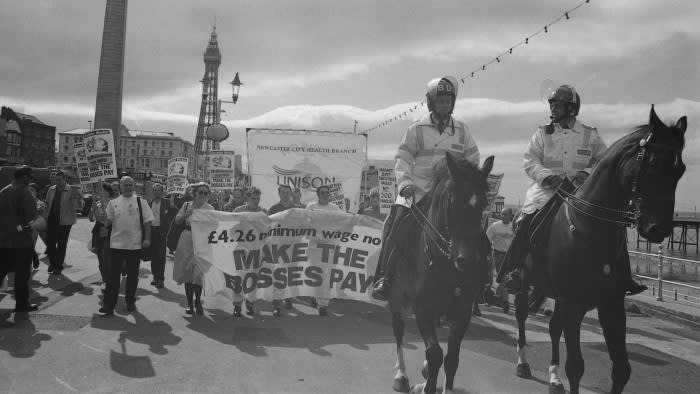Unlock the Editor’s Digest for free
The writer chairs the Resolution Foundation, a think-tank
The UK’s policymakers don’t often get asked “where did it all go so right?” So let’s hope they enjoy the 25th anniversary of the minimum wage this month when it rises to £11.44.
Over the past quarter of a century the legal wage floor has lifted the pay of millions. Someone working full-time on the minimum wage now earns £6,000 a year more than if low pay had only risen in line with typical wages during the 21st century. As a result, the UK’s hourly wage distribution has been bent in a more progressive direction: the lowest-paid have narrowed the gap with the middle and with those towards the top. Meanwhile, the predicted hit to employment never materialised.
This is what a policy triumph looks like. But the UK was a late adopter. “Back in the eighties the minimum wage wasn’t controversial at all — nobody thought it was a good idea,” as one early campaigner put it. The move in to the mainstream was rapid but choppy. In the early 1990s, shifts in trade union views plus a new wave of supportive economic research resulted in Labour adopting the policy. Scare stories from business groups and Conservative ministers warned of mass job losses. But before taking office in 1997 Labour honed the arguments in favour and smoothed employer concerns by committing to the creation of an independent Low Pay Commission (LPC) — made up of employers, unions and experts — to steward the policy.
Conservative opposition faded in the face of popular support and business acceptance. By 2015, chancellor George Osborne embraced the Resolution Foundation proposal to task the commission with ensuring the minimum wage reached 60 per cent of typical pay by 2020. Contrary to scepticism, this was met without much difficulty. A more demanding target — two-thirds of typical pay — is now being achieved.

Various lessons stand out. First, credible oversight is vital. The LPC has been a skilled and steady guiding hand in a policy landscape too often marred by amateurism and upheaval.
Second, it was wise to start modestly and then ramp up ambitions.
A third lesson concerns why the minimum wage has not resulted in predicted job losses. This suggests employers in the low wage labour market had more bargaining power over workers than had been thought, making them better placed to absorb upward pay pressure.
The government has now decided to roll forward the existing target for one year, kicking the decision on any future ambition to after the election. A reasonable approach would aim to climb further up the ladder while taking more care with each step. Sustaining the post-2015 pace of increases over the next parliament would take the minimum wage to 72 per cent of median pay by 2029 — one of the highest in the world. This level of ambition would require greater openness about potential trade-offs and willingness to apply the brakes.
To date, the commission has been tasked with avoiding undefined “significant” impacts on employment. Given high levels of employment, the preference of ministers has — rightly — been to press ahead with increases in the minimum wage despite Office for Budget Responsibility projections of a potential small hit to jobs and hours. With a higher target, a transparent framework should allow rises to be weighed against potential employment costs.
The minimum wage is a powerful, but narrow, tool. Going higher while persisting with the UK’s slack approach to wider labour standards creates risks. Over a third of a million workers are paid less than the legal minimum, highlighting the need for stronger enforcement. We need careful increases in the wage floor complemented by greater security over working hours, improved training and less threadbare social security.
These need to be as well-crafted as the UK’s minimum wage if they, too, are to confound the sceptics.
Also Read More: World News | Entertainment News | Celebrity News







